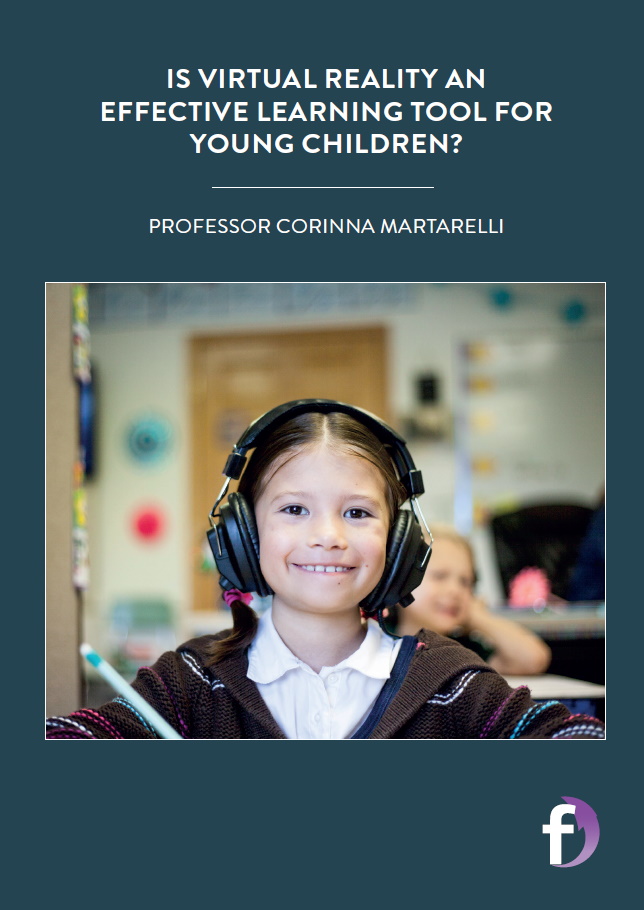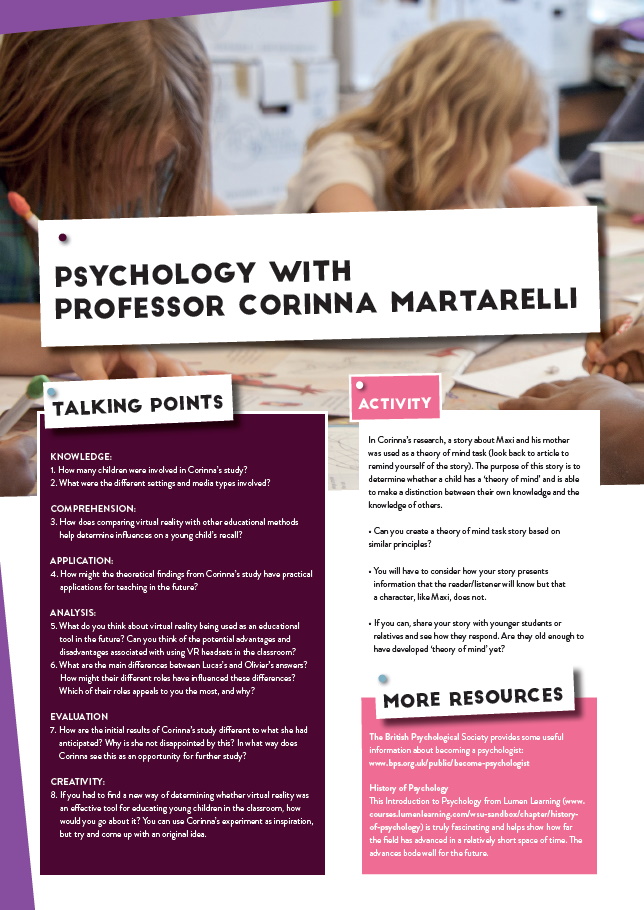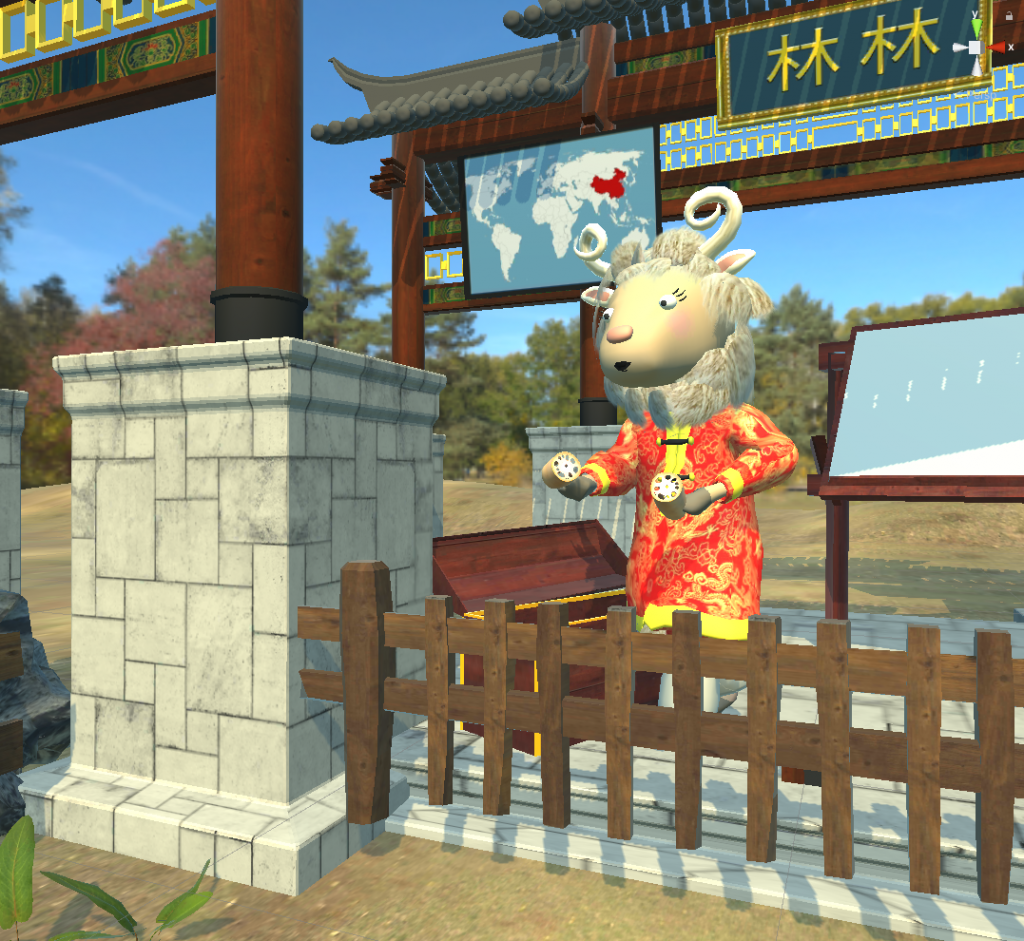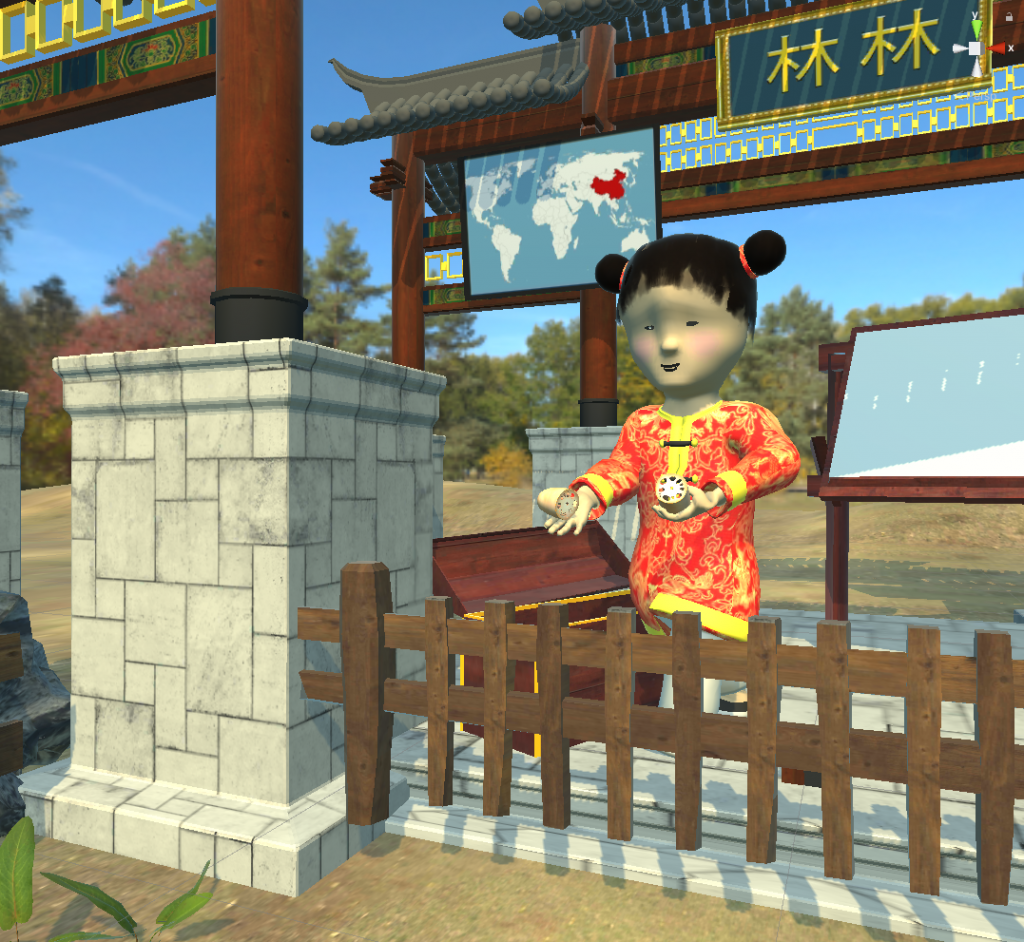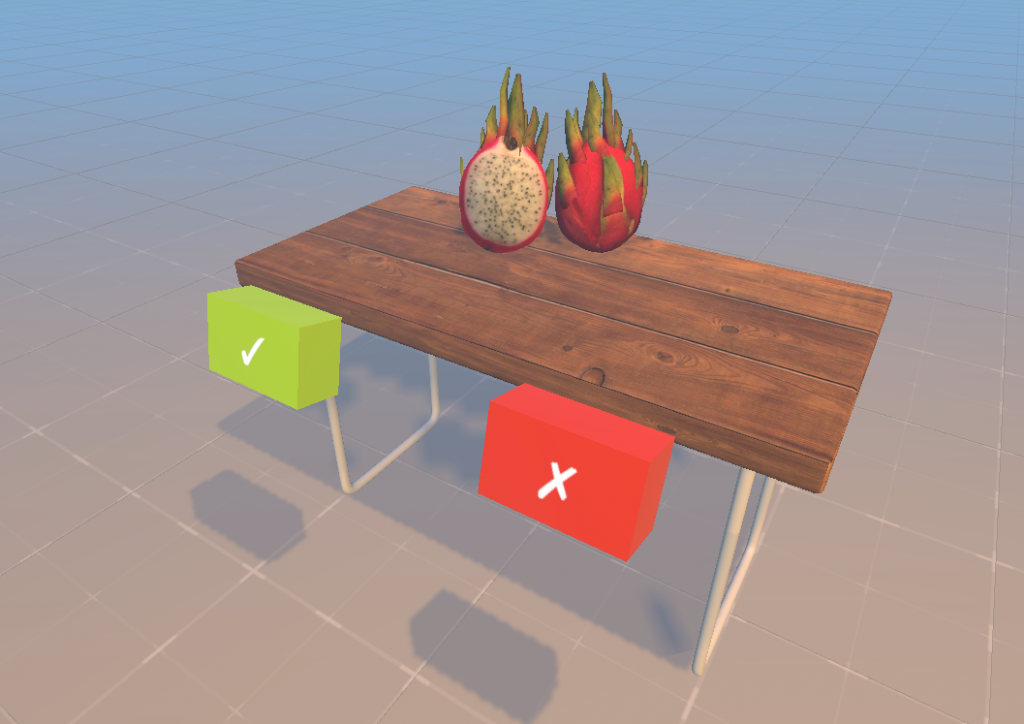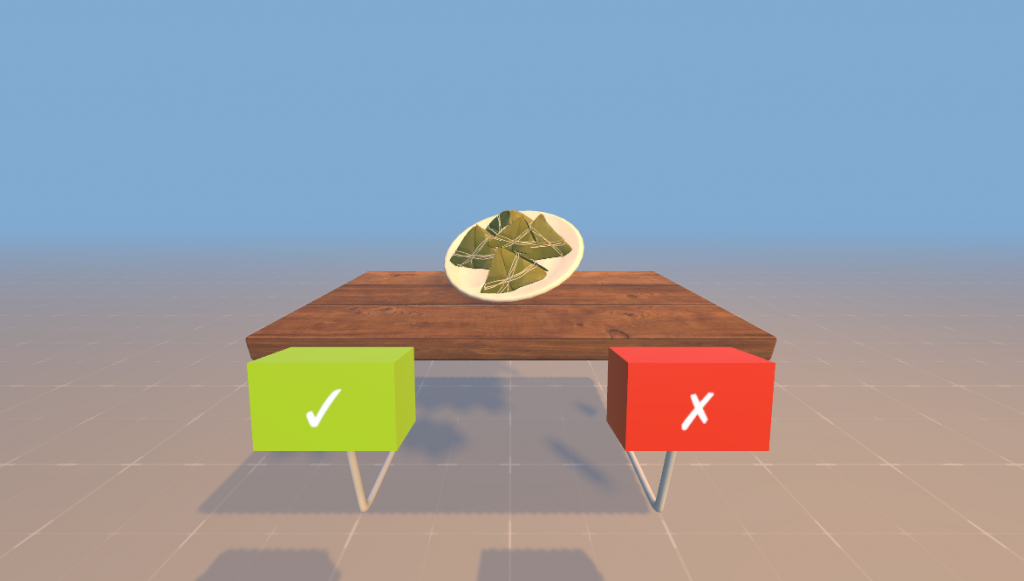Is virtual reality an effective learning tool for young children?
Professor Corinna Martarelli, based at UniDistance Suisse in Switzerland, is the principal investigator of a project that seeks to determine whether realistic or fantastical information given in a virtual setting influences young children’s recall. The findings could have practical implications for education
GLOSSARY
VIRTUAL REALITY (VR) – a computer-generated environment with scenes and objects that appear to be real, making the user feel they are immersed in the computer-generated surroundings
RECALL – the cognitive process of retrieving information from the past
AVATAR – a VR character. For example, representing a player in a computer game. In this research, the avatar is LinLin, a VR character presenting information to the children
THEORY OF MIND – the ability to understand somebody’s mental processes
WESCHSLER INTELLIGENCE SCALE – a measurement that provides an estimate of global intellectual ability
RECEPTIVE LANGUAGE – the ability to understand spoken or written language
COGNITIVE – related to the mental processes of perceiving, knowing and understanding
COGNITIVE LOAD – the amount of information our working memory has to hold at any one time
PROTAGONIST – the main character or one of the leading characters in a story
From magical books to out-of-this-world superheroes, it is easy to link childhood to a love of fantasy. We often regard fantasy as more engaging for children than realism and so, intuitively, often teach young children concepts and ideas through fantastical stories and contexts. But is this intuition right? How beneficial is fantasy within an educational context? Do realistic settings and storylines make recalling information easier for young children?
With improvements in technology, it has become possible to use virtual reality (VR) to create fantasy worlds that appear incredibly real. By putting on a headset, you can be transported to worlds where anything can happen. Armed with this technology, Professor Corinna Martarelli, based at UniDistance in Switzerland, has embarked on a project that is interested in understanding how children differentiate between reality and fantasy and how they learn from fictional and realistic sources.
WHAT FORMS DOES THE RESEARCH TAKE?
Corinna is the principal investigator of the project and works alongside PhD student Lucas Dall’Olio and VR designer Olivier Amrein. Together, they want to ascertain whether the realistic versus fantastical information presented in a virtual setting influences young children’s recall. To achieve this, the team is studying short-term and long-term recall by manipulating different settings (realistic and fantastical) and media types (3D virtual settings and 2D tablets). “168 children, aged five and six, were given the same presentation with either a realistic or fantastical avatar in virtual reality or on a tablet,” says Corinna. “To identify the effect the setting and media type had on the children’s ability to recall information, a series of recall tasks were carried out.”
WHAT TASKS WERE CHILDREN GIVEN IN THE STUDY?
The tasks were divided into recall tasks and theory of mind tasks. The recall tasks were broken down into questions that ascertained the children’s comprehension about the material, recognition tasks about visual stimuli seen in the virtual environment and a transfer task that assessed whether the learned material can be applied to a novel situation in the real world.
The children were also given four theory of mind tasks. “In these tasks, children are told four stories, including materials such as puppets and boxes. In one story, originally developed by Wimmer and Perner in 1983, Maxi and his mother (two puppets) are the protagonists,” explains Corinna. “The story goes like this: The mother puts some chocolate in a blue box.
Maxi leaves the room. The mother moves the chocolate from the blue box to the green box. Then Maxi comes back, and he wants some chocolate.” At this point, the experimenter asks the child three questions: “Where will Maxi look for the chocolate?”, “Where is the chocolate?” and “Do you remember where the mother put the chocolate at the beginning?”.
The idea behind these questions is that children who have a ‘theory of mind’ (and are able to make a distinction between their own knowledge and the knowledge of others), will answer that Maxi will look for the chocolate in the blue box. Previous research has shown that this ability is linked to the ability to distinguish between reality and fantasy.
WERE ANY OTHER TESTS INCLUDED IN THE PROJECT?
Yes – children’s receptive language abilities were also assessed using one subset of the Wechsler Intelligence Scale. In psychological research, researchers often assess variables that might be related to the main research questions. In Corinna’s experiments, an avatar called LinLin explains information about China which requires receptive language abilities to understand. These abilities might play a role in recall, so by testing them, the team can include these values in its statistical models and take language abilities into account when conducting analyses.
Reference
https://doi.org/10.33424/FUTURUM253
VIRTUAL REALITY (VR) – a computer-generated environment with scenes and objects that appear to be real, making the user feel they are immersed in the computer-generated surroundings
RECALL – the cognitive process of retrieving information from the past
AVATAR – a VR character. For example, representing a player in a computer game. In this research, the avatar is LinLin, a VR character presenting information to the children
THEORY OF MIND – the ability to understand somebody’s mental processes
WESCHSLER INTELLIGENCE SCALE – a measurement that provides an estimate of global intellectual ability
RECEPTIVE LANGUAGE – the ability to understand spoken or written language
COGNITIVE – related to the mental processes of perceiving, knowing and understanding
COGNITIVE LOAD – the amount of information our working memory has to hold at any one time
PROTAGONIST – the main character or one of the leading characters in a story
From magical books to out-of-this-world superheroes, it is easy to link childhood to a love of fantasy. We often regard fantasy as more engaging for children than realism and so, intuitively, often teach young children concepts and ideas through fantastical stories and contexts. But is this intuition right? How beneficial is fantasy within an educational context? Do realistic settings and storylines make recalling information easier for young children?
With improvements in technology, it has become possible to use virtual reality (VR) to create fantasy worlds that appear incredibly real. By putting on a headset, you can be transported to worlds where anything can happen. Armed with this technology, Professor Corinna Martarelli, based at UniDistance in Switzerland, has embarked on a project that is interested in understanding how children differentiate between reality and fantasy and how they learn from fictional and realistic sources.
WHAT FORMS DOES THE RESEARCH TAKE?
Corinna is the principal investigator of the project and works alongside PhD student Lucas Dall’Olio and VR designer Olivier Amrein. Together, they want to ascertain whether the realistic versus fantastical information presented in a virtual setting influences young children’s recall. To achieve this, the team is studying short-term and long-term recall by manipulating different settings (realistic and fantastical) and media types (3D virtual settings and 2D tablets). “168 children, aged five and six, were given the same presentation with either a realistic or fantastical avatar in virtual reality or on a tablet,” says Corinna. “To identify the effect the setting and media type had on the children’s ability to recall information, a series of recall tasks were carried out.”
WHAT TASKS WERE CHILDREN GIVEN IN THE STUDY?
The tasks were divided into recall tasks and theory of mind tasks. The recall tasks were broken down into questions that ascertained the children’s comprehension about the material, recognition tasks about visual stimuli seen in the virtual environment and a transfer task that assessed whether the learned material can be applied to a novel situation in the real world.
The children were also given four theory of mind tasks. “In these tasks, children are told four stories, including materials such as puppets and boxes. In one story, originally developed by Wimmer and Perner in 1983, Maxi and his mother (two puppets) are the protagonists,” explains Corinna. “The story goes like this: The mother puts some chocolate in a blue box.
Maxi leaves the room. The mother moves the chocolate from the blue box to the green box. Then Maxi comes back, and he wants some chocolate.” At this point, the experimenter asks the child three questions: “Where will Maxi look for the chocolate?”, “Where is the chocolate?” and “Do you remember where the mother put the chocolate at the beginning?”.
The idea behind these questions is that children who have a ‘theory of mind’ (and are able to make a distinction between their own knowledge and the knowledge of others), will answer that Maxi will look for the chocolate in the blue box. Previous research has shown that this ability is linked to the ability to distinguish between reality and fantasy.
WERE ANY OTHER TESTS INCLUDED IN THE PROJECT?
Yes – children’s receptive language abilities were also assessed using one subset of the Wechsler Intelligence Scale. In psychological research, researchers often assess variables that might be related to the main research questions. In Corinna’s experiments, an avatar called LinLin explains information about China which requires receptive language abilities to understand. These abilities might play a role in recall, so by testing them, the team can include these values in its statistical models and take language abilities into account when conducting analyses.
WHAT ARE THE ANTICIPATED OUTPUTS FROM THE PROJECT?
The more knowledge that can be gathered about how young children learn and recall information, the better the ability to develop effective learning tools. “Fictional material is often used in education settings, and it is possible that VR might be used more frequently in the future, but it is unclear how such material affects learning and memory in young children,” says Corinna. “Before implementing virtual reality tools in schools, we need solid evidence that these tools are as good as or better than more traditional methods.”
WHAT WERE THE FINDINGS FROM THE PROJECT?
After controlling for theory of mind and language abilities, the children’s recall performance was better when presented by a realistic (rather than a fantastical) avatar, especially in the long-term (one week after the presentation). This result may be explained by the importance of prior knowledge. “Contrary to our expectations, children’s recall performance was reduced in the virtual reality condition when compared to the tablet condition,” explains Corinna. “The findings have theoretical as well as practical relevance. For example, relating to the use of fantasy in educational contexts.”
WHAT ARE THE NEXT STEPS FOR CORINNA’S RESEARCH?
Given that the results were not what the team expected, the next steps are centred on improving understanding about the counterintuitive findings. “We are planning follow-up studies to better understand the underlying mechanisms. Why did young children in the tablet group, in this specific situation, with this specific learning material, outperform children in the virtual reality group?” says Corinna. “Some suggest that virtual reality implies the processing of large amounts of cognitive information that is not linked with the learning objective, so we want to reduce cognitive load by testing a version with fewer details to help children focus on the learning material.”
It is possible that the novelty of VR affects the outcome – many children are familiar with tablets but are unaccustomed to VR headsets – so Corinna and the team want to understand the extent to which the novelty of the situation affects the results. Understanding the effects and impacts of VR on a young child’s ability to learn and recall information could impact future educational materials and methods.
 PROFESSOR CORINNA MARTARELLI
PROFESSOR CORINNA MARTARELLI
Faculty of Psychology, UniDistance Suisse, Switzerland
FIELD OF RESEARCH: Psychology
RESEARCH PROJECT: Investigating the educational impact of realistic versus fantastical information when presented on a tablet or through virtual reality
FUNDER: This work is supported by the Swiss National Science Foundation (SNSF), under award number 100019 185477.
 PROFESSOR CORINNA MARTARELLI
PROFESSOR CORINNA MARTARELLI
Faculty of Psychology, UniDistance Suisse, Switzerland
FIELD OF RESEARCH: Psychology
RESEARCH PROJECT: Investigating the educational impact of realistic versus fantastical information when presented on a tablet or through virtual reality
FUNDER: This work is supported by the Swiss National Science Foundation (SNSF), under award number 100019 185477.
ABOUT PSYCHOLOGY
Psychology is the scientific study of the human mind and how it dictates and influences our behaviour. Psychologists are involved in many different aspects of the field, including communication, memory, thought and emotion. As Corinna’s research shows, psychology is a multifaceted field that can include many different (though related) sub-fields of study.
WHAT DOES CORINNA ENJOY ABOUT THE CHALLENGES INVOLVED IN PSYCHOLOGY?
One of the main appeals of Corinna’s field of study is the underlying process of science – that each result her work obtains opens up new questions and directions for future study. “I really love the discrepancy between expected results and real results that happens from time to time,” explains Corinna. “These differences can make us humble as researchers and remind us that science is a constant process.”
WHAT ARE CORINNA’S PROUDEST CAREER ACHIEVEMENTS, SO FAR?
Corinna highlights seeing the happiness of her team as hugely significant, especially when she has led it in the completion and publication of a study. “Seeing students and team members discover the process of science is always rewarding,” says Corinna. “I enjoy seeing the creative aspects when my team comes up with an idea, but also the more methodological parts, where the team designs an effective experiment or conducts statistical analyses.”
WHAT RESEARCH OPPORTUNITIES WILL BE OPEN TO THE NEXT GENERATION OF PSYCHOLOGISTS?
In the future, academic research will become more interdisciplinary, where educators, psychologists, teachers, computer scientists and designers will collaborate. “I see this as a positive for future psychologists,” says Corinna. “Outside academia, psychologists are employed in several fields, such as clinics, hospitals, schools, government, private companies, etc. I think that psychologists will be very much needed in several domains in the future.”
EXPLORE CAREERS IN PSYCHOLOGY
• The British Psychological Society is a brilliant resource that is dedicated to promoting excellence in psychology.
• Verywellmind provides a wealth of student resources.
• The American Psychological Association has lots of useful career information.
• If you are interested in academic psychology, Corinna recommends doing an internship in a research lab to get an insight into the field. If, like her, you are based in Switzerland, find more information here:
www.psychologiestudierende.ch/how-do-i-get-an-internship-in-psychology
If you are in the US, visit: www.psychology.org/resources/how-to-find-an-internship
In the UK, read more about internships here: thepsychologist.bps.org.uk/volume-22/edition-10/benefits-internships
• According to the National Careers Service, the average salary for a psychologist in the UK is between £24,000 to £60,000 depending on the level of experience – although studying psychology can lead to many different jobs with differing salaries.
• Payscale has the average salary for a psychologist in Switzerland as 87.000 Fr.
PATHWAY FROM SCHOOL TO PSYCHOLOGY
“There are a lot of methods and statistics in the study of psychology that are often underestimated, so mathematics
and science will help,” explains Corinna. “Creative and critical thinking are also important, so consider that throughout your studies.”
Visit Prospects to find out more about routes into psychology.
MEET THE TEAM

LUCAS DALL’OLIO
PhD student
WHAT IS YOUR ROLE IN THIS RESEARCH?
I am the main investigator of this research. As such, I am involved in almost every step of the study, from its design, recruitment of participants, testing, analysis and valorisation of the results.
HOW HAS YOUR CAREER PATH LED TO THIS CURRENT PROJECT?
I have always had a great interest in new technologies and their daily use. My professional experience has allowed me to work with children and I realised that it was an area I enjoyed even more when applied in the field of psychology and learning.
WHAT WERE YOUR INTERESTS AS YOU WERE GROWING UP?
I always liked to solve problems, whether it was through games, brain teasers or other puzzles. I find many of these interesting elements within the world of psychology research.
WHO OR WHAT INSPIRED YOU TO BECOME A PSYCHOLOGIST?
When I arrived at university, I had chosen to study psychology without really being sure that I was going to make it my profession. However, when I took my first courses, that focused on the world of research, and read my first articles, I was immediately attracted to this way of working and thinking.
WHAT DO YOU FIND REWARDING AND CHALLENGING ABOUT PSYCHOLOGY?
What I like about research in psychology is that you have to constantly question yourself and find new and innovative ways to observe what you want to observe and measure what you want to measure. We are still far from having all the keys to understanding how our brains work and participating in the development of this field of knowledge is exciting.
WHAT ATTRIBUTES HAVE MADE YOU SUCCESSFUL AS A PSYCHOLOGIST?
I think my main qualities are perseverance, critical thinking and attention to detail. I also believe I have good communication and empathy skills, which are essential.
WHAT ARE YOUR PROUDEST CAREER ACHIEVEMENTS, SO FAR?
As a young researcher, I like to think that my proudest career achievement is ahead of me! Still, I was very proud to finish collecting the data from my first study and present the first results to the faculty of psychology. Preparing a study and collecting data is one thing, but being able to showcase research through meetings or conferences is the pinnacle of our work and brings a lot of satisfaction.
WHAT ARE YOUR AMBITIONS FOR THE FUTURE?
I would like to publish our first study in a scientific journal and complete my PhD. I then hope to continue to participate in the development of knowledge on the use of new technologies in learning.

OLIVIER AMREIN
VR Designer
WHAT IS YOUR ROLE IN THIS RESEARCH?
I am responsible for creating the virtual reality (VR) experience. This includes designing the two versions of the LinLin character (realistic and fantastical), as well as the environment and 3D objects presented by LinLin. I also animate the movements and lip synching based on the recorded audio in French and German.
HOW HAS YOUR CAREER PATH LED YOU TO THIS RESEARCH?
I did not follow a traditional school/university path – I began at the dawn of the internet as a self-taught person. I was always interested in science and consider myself at the frontier between artistic/creative and technical/scientific.
WHAT CHALLENGES DOES THIS RESEARCH POSE FOR YOU AS A VR DESIGNER?
In projects for commercial clients, I usually follow a creative brief and I interpret it as I see fit. Here, the challenge was to create a more controlled story, because in this kind of research, we do not want random factors to influence our results.
WHAT ATTRIBUTES HAVE MADE YOU SUCCESSFUL AS A VR DESIGNER?
A capacity to hold deadlines, and being able to prototype environments or experiences rapidly, which gives a quick overview of whether a creative direction is working or not. If it is not working, I start again!
WHAT ARE YOUR PROUDEST CAREER ACHIEVEMENTS, SO FAR?
Every career step or project is different from the previous one, so, for me, it’s important to know that I am always learning and improving. Teaching and sharing are important, so seeing people who I have coached or helped making great art or conducting projects is a proud achievement for me.
WHAT ARE YOUR AMBITIONS FOR THE FUTURE?
I would like to continue working on research projects where I can bring my skills as both a technician and a designer. We are only at the dawn of what virtual reality and extended realities can do. There is still so much to explore.
Do you have a question for Corinna, Lucas or Olivier?
Write it in the comments box below and Corinna, Lucas or Olivier will get back to you. (Remember, researchers are very busy people, so you may have to wait a few days.)

